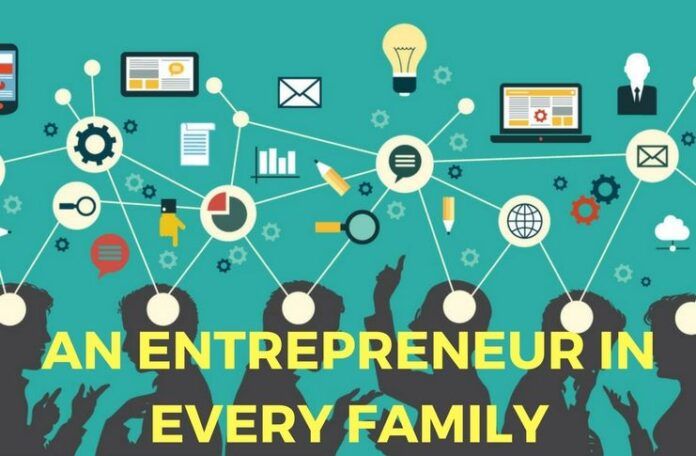
Government should promote entrepreneur’s through startup’s
[dropcap color=”#008040″ boxed=”yes” boxed_radius=”8px” class=”” id=””]T[/dropcap]he job market the world over is becoming increasingly competitive. Old jobs (including some not very old) are fast disappearing and newer ones are coming up, due to automation, increasing efficiency in workplace and evolution of technology. The sad part is, a lot more of old jobs are disappearing than newer ones coming up. So, everywhere, solving unemployment problem is becoming increasingly difficult.
Let’s turn our attention to families. In most families, both the husband and the wife are employed
In India, though retirement age is advancing to 60 and beyond, compulsory retirement and retrenchment are also commonplace, even among young people. People are finding it extremely difficult to get and retain jobs.
Whether it is IT or other fields, the qualifications and skill sets required are increasing. MBBS doctors are becoming irrelevant in urban India. Newer and higher level IT skills are required by IT industry. PG in Engineering is becoming the preferred qualification for higher positions even in the engineering industry.
Let’s turn our attention to families. In most families, both the husband and the wife are employed (or want to be employed). Families are getting nuclear. So, the time parents are able to devote to their young children is shrinking. In most families, they decide to have just one child, as they find managing two kids demanding.
[dropcap color=”#008040″ boxed=”yes” boxed_radius=”8px” class=”” id=””]W[/dropcap]owever, people understand the importance of work-life balance more than ever before, and so they find seek solutions within these demanding boundary conditions. In many families, either the husband or the wife explores options of flexi-time work in their jobs in order to devote time to their home and kids, but most often, the flexi-time options offered don’t solve the problems faced by the family and kids.
If Parsis, Marwaris or Gujaratis have business in their blood, it is because someday, in the distant past, someone in their lineage first ventured out, took a risk and built a business.
Even the double income from working couple is now seen as inadequate to meet financial commitments, due to higher levels of lifestyle that they want to lead, the high cost of private education of kids because of high aspirations, savings needed to buy homes on EMI and to provide for life after retirement, high cost of life and medical insurance, and in some cases, to take care of their ageing parents.
In this scenario, entrepreneurship is an option that could offer the right solution to such families. Though entrepreneurship (whether involving technology, products, projects, services, or even trading) involves investment and risk, apart from foregoing regular income, the rewards are extremely enticing, more than offsetting the risk.
Yet, such a thought frightens most couples, as they are used to secure lives. The risks and the other problems that go with business are so scary that they don’t even want to consider this option. But if they think cool-headedly, they will see the wisdom of exploring it.
If Parsis, Marwaris or Gujaratis have business in their blood, it is because someday, in the distant past, someone in their lineage first ventured out, took a risk and built a business. And the financial security of their families is ensured for generations. They create jobs and are an asset to the society.
[dropcap color=”#008040″ boxed=”yes” boxed_radius=”8px” class=”” id=””]T[/dropcap]he advantage that a modern day employed couple have is that they are both educated, have stable jobs, and it should be possible for them to manage their household expenses within the income of one of them, even if difficult for a few years. One of them can take the risk and try out a business venture, with part-time involvement of the other partner after office hours, if required.
As to who among the couple will venture into business could depend on factors such as who earns less, who is more entrepreneurially oriented and who will have the time and mind space to manage the home and the kids.
Incubation period of the business may be a little difficult, but once it stabilizes, either both of them can continue the same way, with one in business and the other in job, or the one in job can quit the job and join the business, full time or part time, and try to take it to a higher plane.
We have heard of such success stories in our times, with the Narayanamurthy and co- promoters of Infosys being the most glaring examples. The interview of Mr Sree Iyer with Mr Karunakaran only reinforces the viability of this model.
[dropcap color=”#008040″ boxed=”yes” boxed_radius=”8px” class=”” id=””]I[/dropcap]f the business succeeds, the family has the chance to become a business family for generations. In the event the business venture doesn’t take off successfully, the one in business can either try some other venture, preferably a safer one like trading or return to the full-time job.
Either way, these will be among the most memorable years in the married life of the couple. Human life is meant for not mere survival, but also for exploration and discovery. And since one of the family partners is likely to get more time to manage family and kids, there will be more peace and happiness in the home.
To make this succeed, PM should consider owning this idea and promoting it big time (like he promotes ‘Start Up India’ and ‘Stand Up India’ programs), and also offer assistance like incubation, financing, marketing, consultancy, mentoring, etc from the Government. Being a Gujarati, his words will carry conviction.
Experienced government employees can be given 3-5 years of sabbatical to try their hands at entrepreneurship, with an assurance of return to the job if they don’t succeed.
[dropcap color=”#008040″ boxed=”yes” boxed_radius=”8px” class=”” id=””]T[/dropcap]his initiative can unleash entrepreneurship and create plenty of direct and indirect jobs in MSME sector, not counting the jobs given up by the entrepreneurs (which will be available for other job seekers). Coupled with other initiatives of the Government, this can help solve the problem of unemployment in a significant way.
If millions (if not crores) of families can be persuaded to sign up, by the law of averages, a few of them would succeed very well and go on to become big business, some would succeed moderately and hold on, while some would fail and get back to jobs.
And the Government would have created an entrepreneurial culture in India, very much required for India to advance to higher levels of growth, with very little of Government’s own investment.
Note:
1. The views expressed here are those of the author and do not necessarily represent or reflect the views of PGurus.
- How BJP can get 33%+ vote share in TN - April 1, 2024
- A transparent, equitable electoral funding alternative - March 19, 2024
- How TN BJP can come to No. 1 or No. 2 in 2024 LS polls - January 11, 2024











We must welcome positive ideas for the sake of future well being of our society . Let us not digress . Our democracy , political system and access to enormous country resources have festered a system of plundering the purse for personal gain . Leave that aside for the moment as way out has to be found in many novel ways .
It is true we have a well educated lot of citizens and shortage of avenues to showcase their prowess and fulfill their claim of a rightful share for their effort . It is this group we must focus as per this suggestion . Entrepreneurs are needed locally in every village to creatively use the talent available and local resources to bring back to life some of our past vocations and help them spread to other areas . Agriculturists , artisans , service aggregators , resource planners – land , water , energy needs – region based traders etc .
Corp social resp initiatives should be directed in nurturing this need , educators should include talent nurturing workshops in curriculum with ranking within the institute as rewards , form a dedicated stream of IAS , IPS , IFS freshers to focus on nation building initiatives , use local resources for economic uplift of communes …….. and many more .
The challenge will be to keep these isolated from the ills of current society by bringing them under multiple ombudsman audit – people of proven integrity in their run up the success ladder . ( Read many Kamarajs, Abdul Kalams , Murthys )
This article has practical tips for youngsters and many of it can be applied in their lives.Few thoughts from my experience . I worked in companies before i went solo and realised fun of doing things on my own facing the consequences.If I had done it when I was 25 or there abouts, I would have been more positive but then when I look back why I didn’t start much earlier, the answer lies in my background.Almost all the people known to me – Father/uncles and other close relatives have all been career oriented.The other major reason is my poor knowledge of handling money or what money can do or how to get money and use it wisely.Early one understands money easier for one to get into business/entrepreneurship.One way to do it is to sit with a knowledgeable chartered accountant and learn the basics.
I appreciate your lofty thoughts and dreams.
But ground realities are totally different
At every step of the way corruption and bureaucracy will take it’s toll before the money runs out. and to survive one has to pay bribes- both to the government sector and the private sectors. Maybe 1 in 100 of these entrepreneurs will survive.
Nothing can change in my India till corruption is rooted out. But then corruption is in the life blood of most Indians. How many Indians can say I have never paid a bribe? Will take at least 2 generations to be cleaned if the effort starts now.
I became an entrepreneur in 2000, and have been able to sustain till now succcessfully. I’ve seen highs and lows. I have interacted with may entrepreneurs. Corruption has rarely been a drag during NDA/ UPA times, DMK/ ADMK times, in MSME business, as far as I know.
The total number of occasions when you have to bribe while in business is very small and usually petty, unless you want to build business thru corruption. If you read survey after survey, you’ll find corrruption hardly ever hindering entrepreneurship. For example, when you want to add a new product to your list for VAT, it will get delayed by a month or two, and if you pay us Rs 500/ 1000, you’ll get it early. If you don’t pay, they don’t delay indefinitely.
The main challenges are access to finance, technology, market, clients, receipt of payments in time, cheque honouring, etc. If someone bribes and gets finance (which is not required if one gives collateral), it usually works to the advantage of the entrepreneur (by deceitful means), and hurts the lender and the economy. This is a different problem, not one of corruption hindering entrepreneurship.
But, if you’re unwilling to pay any bribe occasionally, even petty amounts for lowly officials, you’ll find it difficult to run business. But this is true even for non-businesspersons.
I’d like to hear from some other entrepreneurs.
You appear to be just another cog in the wheel. Your mind has accepted that in order to do business you will do what it takes. You justify payment of bribes occasionally , play around with the quantum of bribes. At each higher level there is corresponding increase. Fact is when you pay a bribe you are an accomplice in crime. (Check the law before you write like you have for your protection). Then you will state everyone is doing it. Sure all politicians have been and are entrepreneurial. That’s a business too . Maybe you sell products. They sell their services viz influence peddling, use of thugs and goons etc. These are the people who govern you. What shocks you is when you realise some politicians like example SG, Lallo, PC etc appear to have made money for the next 100 generations. Your mind accepts small bribe takers but not the big ones. Quantum is the shocker.
And then after each days work is over you will meet with similar people like you over a drink , exchange gossip, clap each other on the back and move on after saying – That’s life for you.
Both of you are right and wrong..Nathan for pointing out that in this crocodile waters of corruption,it is not easy to be scrupulous and be an entrepreneur.I agree 100% on this from my personal experience.I thought our 56″ will set the ball rolling by making it a precondition for govt. officials.Alas.What Ganesan has pointed out correctly is that one should have an attitude of positivism in entrepreneurship.My experience is younger one is, greater the positivism.Older people are always sceptic,not bad as such but an hurdle in entrepreneurship.
There are 2 kinds of bribe situations:
1. When you bribe to get a business deal or a favour which you’re not entitled to.
2. When you’re required to bribe to get even your entitlement, within a reasonable time.
In business and personal lives, though most people don’t like to give bribes, most people yield to get on with their lives, in the latter kind of situations. It’s another matter that, if all the people get the opportunity to be in the former situation, most people, IMHO, will grab the opportunity with both hands. This is the real world we’re living in.
In my young days, when I bought a small Housing Board plot in auction and was asked for bribe to get what was my legitimate right, I took the risk and wrote to higher ups. I got my work done without paying bribe though after a long delay. It was a frustrating experience. And the lady official who demanded bribe was transferred out, inconveniencing her family life (but nothing more).
But over time, I had to decide whether my goal in life would be to keep fighting even small officials to get my entitlements or fight only bigger issues. I used to be an idealist, but since the society is not with me in the fight, I decided to back off, and be more practical.
Even now, my house ownership has not been registered my name by the Corporation 10 years after I bought it, because they demand bribe. I pay commercial tax rate for my residential property (where I live) because they demand bribe to do this. I have not paid these bribes because these are inconveniences I can put up with. But if required some day, I may have to pay up in these situations. These are just 2 examples.
When it comes to business, if we say we’ll fight every small corruption even to get our dues, we’ll be out of business in no time. If there are fewer businesses, there will be fewer jobs. I think we should be practical, even as we fight the system. The society evolves; it doesn’t work exactly to a set of rules from day 1.
But the day I bribe to get a favour I don’t deserve, I believe my moral standpoint will become weak. Till then, I believe I’m morally on a strong wicket.